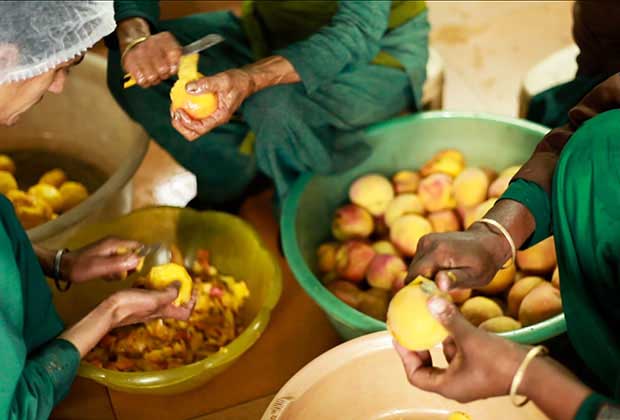How A Jam Was Born
- By Rituparna RoyLoading...
- | 4 Sept 2015 2:52 PM IST
 X
X
 Bhuira women prepping to make jams.
Bhuira women prepping to make jams.
One of the many things that Linnet Mushran missed after moving to India was the jams she grew up eating at her home in England. “My parents had a big garden full of berries and my mother would make jams and jellies every season,” she says.
So when Indian jams failed to please her, she decided to make her own. Bhuira Jams was born when Linnet visited her husband’s family home, replete with apple orchards, in a village by the same name in the Sirmaur district of Himachal Pradesh. Struck with nostalgia, Linnet started replicating her mother’s jellies, which today proudly rest on many a supermarket shelf across the country.
For most of us who grew up eating Kissan jam on toast for breakfast, Bhuira comes as a breath of fresh air. Linnet maintains their products are free of artificial preservatives, and prepared using the juice of the fruit and sulfur-less sugar. What makes them unique is the fact that they are totally handmade by the local women of Bhuira.
Today, Bhuira produces 27 variants including jams, jellies and chutneys using stoned varieties of fruit found in the Himachal region – apricots, peach, plums and cherries to name some. “I think we are the only ones making black cherry jam in the country!” quips Linnet.
 Bhuira Jams are totally handmade and natural.
Bhuira Jams are totally handmade and natural.
But, what has been more fulfilling for her is empowering the women of Bhuira by employing them in the manufacturing process. “The region was very poor when I came in. Women practically had no cash and would starve as they were mostly abandoned by their families. This way we were able to generate income for the women,” she says. Not just that, even the marginal farmers in the area were boosted as Linnet would prefer buying their produce instead of the big sellers. “Actually it made no sense for them to travel to bigger towns to sell the fruits as they would hardly make any money considering there are transportation costs too,” adds Linnet.
Things are looking up, all thanks to the Mushran women – the newest member to join the business is Linnet’s daughter-in-law, Rebecca Maria Vaz! Today, Bhuira Jams owns two factories producing 80 tonnes of jams a year, has around 20 full-time women employees and more than 100 women who join the fruit cutting, peeling, washing and extracting the juice when the season is on.
Rebecca, who is based in Mumbai, is now responsible for taking the business to new heights. “Our next step is to make Bhuira Jams available online on all the major portals as well as departmental stores. After Delhi, Himachal, Uttarakhand, Goa and Chennai, we are targeting Mumbai, Hyderabad, Pune, Bangalore and Kolkata,” she says. Plans to approach hotels with 25 gm bottles are also in the pipeline.
Bhuira Jams is available online at Pepperfry.com & are priced at Rs. 140 (average) for a bottle of 240 gms.



